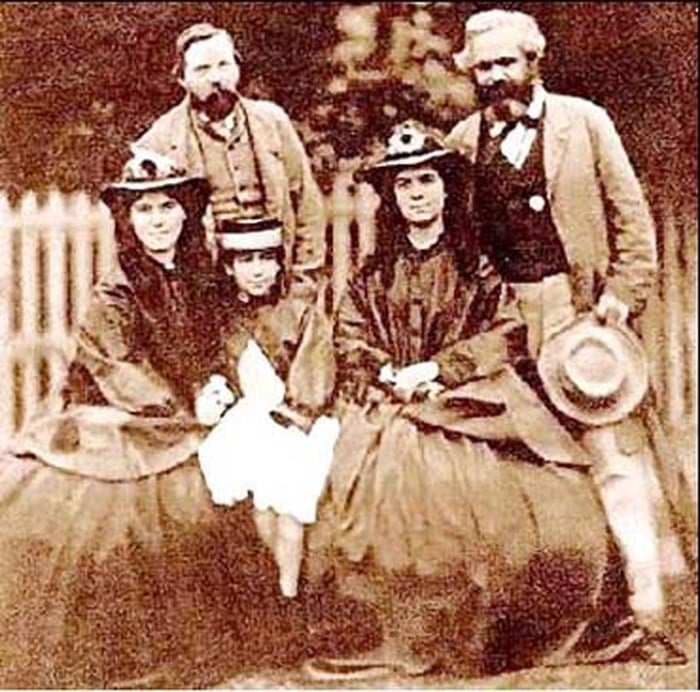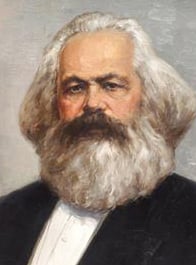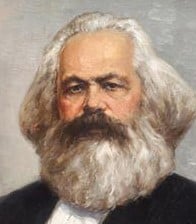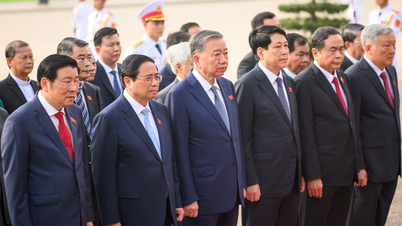Karl Marx was born on May 5, 1818, into a middle-class family in the Rhineland city of Trier, Germany. At the age of 17, Marx received a classical education and studied for a year at the law faculty of the University of Bonn. At the age of 18, he and Jenny von Westphalen (1814 - 1881) became engaged. He began to be influenced by the philosophy of GWF Hegel, which later dominated the German Idealist movement.
The Marx family took a photo with Engels.
After completing his doctoral thesis, he turned to journalism and began working for the Rheinische Zeitung. He quickly became editor-in-chief, but the authorities closed the paper in May 1843 and Marx moved back to Paris.
While in Paris he developed a lasting association with F. Engels, and set out his thoughts on communism which are now known as the Paris Manuscripts. After being expelled from France, he moved to Brussels and recorded his philosophical ideas developed in the Theses on Feuerbach.
In 1846, Marx and Engels wrote The German Ideology, which laid the foundation for the Communist Manifesto. Back in France, he began work on a series of pamphlets on the Class Struggle in France, and it was during this time, in 1848, that he and Engels published The Communist Manifesto.
After moving to London in 1849, Marx devoted many years of effort to his major work, Capital, written in German, an analysis of capitalism, the capitalist mode of production, and capitalist relations of production.
The slogan “Workers of the World Unite” was the rallying cry for the Russian Bolshevik revolution and the Chinese revolution of 1949; and Karl Marx's movement “From each according to his ability and to each according to his needs” became a source of inspiration for Communist Parties around the world.
Karl Marx (1818 - 1883)
Before World War I, Marx's writings elicited some positive responses from outside Eastern Europe. Lenin's enthusiastic support was a key factor in the Russian revolutions, and part of the official ideology of the Soviet Union was shaped by postwar influences. In 1920, the Frankfurt Society, an organization of intellectuals who met to discuss and disseminate Marxism, was later joined by the American philosopher Herbert Marcuse.
Marxism became a major intellectual force in Western Europe and the English-speaking world in the 1930s, its intellectual influence peaked in the 1970s, but has since declined. Marx's surviving intellectual legacy is limited to the tenets of philosophy.
The legacy of Marx is immense. Marxism became the official ideology of the countries that were at the height of their existence, which was considered the third race for survival. His theories also influenced the emergence of socialist democratic movements that had previously rejected or banned Marxism as their ideology.
Some of his works, especially the Communist Manifesto, are familiar to millions of political activists around the world, and were instrumental in the adoption of forms of Communism by the Soviet Union, and subsequently by the governments of Cuba, Venezuela, Bolivia, Nicaragua, and other countries.
Throughout the later years of his life until his death in 1883, Marx was an active supporter of the Communist League, which later became the Communist International.
CTĐTTĐCSVN
Source: https://baoquangtri.vn/cuoc-doi-va-nhung-cong-hien-cua-nha-tu-tuong-vi-dai-cac-mac-193432.htm





![[Photo] Solemn opening of the 9th Session, 15th National Assembly](https://vphoto.vietnam.vn/thumb/1200x675/vietnam/resource/IMAGE/2025/5/5/ad3b9de4debc46efb4a0e04db0295ad8)



![[Photo] National Assembly delegates visit President Ho Chi Minh's Mausoleum](https://vphoto.vietnam.vn/thumb/1200x675/vietnam/resource/IMAGE/2025/5/5/9c1b8b0a0c264b84a43b60d30df48f75)

















![[Photo] Bus station begins to get crowded welcoming people returning to the capital after 5 days of holiday](https://vphoto.vietnam.vn/thumb/1200x675/vietnam/resource/IMAGE/2025/5/4/c3b37b336a0a450a983a0b09188c2fe6)
![[Photo] General Secretary To Lam receives Sri Lankan President Anura Kumara Dissanayaka](https://vphoto.vietnam.vn/thumb/1200x675/vietnam/resource/IMAGE/2025/5/4/75feee4ea0c14825819a8b7ad25518d8)




































































Comment (0)